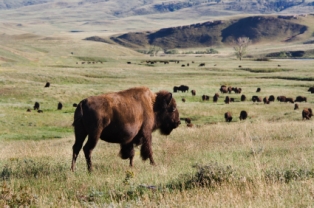Some Recollections on Recalls
Lots of Beef Recalls, But Can You Think of a Bison Recall?
Is it me, or does it seem like food recalls have never been higher than they have been in the past few years?
Whether its peanuts or peppers, sausage or spinach, it seems like there’s always a food in the headlines that’s being thrown out by the thousands of pounds.
No food rivals beef in the number of recalls.
Do a simple Google search of “beef recall” and you’ll receive a huge listing of beef recalls that have occurred in the past few months, never mind the last few years.
The latest beef recall comes from the Centennial state of Colorado, where 41,000 additional pounds of beef are being snapped up from store freezers and shelves, as the number of people stricken with E-coli has increased since the original recall (the original recall occurred on June 24th, when 380,000 pounds of beef was recalled).
But the list of recalls doesn’t stop in Colorado. Less than three weeks ago, a South Carolina meat processing plant recalled pounds of ground beef after E.coli contamination; a Chicago company did the same thing a few days ago (their recall totaled around 6,100 pounds of beef); and another Chicago company recalled 240,000 pounds of ground beef in May…only the 240,000 pounds were recalled for reasons unrelated to E.coli – theirs was because of metal clips found lurking within several pounds of ground beef.
Nice.
But as many recalls as there have been in the last month with beef, I defy anyone to “recall” of a bison recall over the past several years.
This is not to say that there hasn’t been one, but I certainly can’t think of one (In fact, if you can think of one, I’d like to know about it).
There are several reasons for this. One of them is that bison, unlike cattle, is not a mainstream commodity. There are far fewer bison that undergo inspection by the USDA per day, thus a smaller pool of potential bison sources that could be infected with some food-borne disease.
Another reason is that bison are primarily raised by private ranchers. In fact, among the 225,000 estimated bison in the country, 198,000 of them roam on private land. And since private farmers know that bison is a “niche” meat – a meat that mostly health conscious consumers are interested in – it’s in their economic interest to make sure their bison remain as healthy as possible.
And given the bison industry is only recently making strides economically, an E.coli outbreak among bison could very well send the bison back to the brink of extinction due to diminished demand (there were only around 1,000 bison on the planet at the turn of the last century).
There is always the chance that bison will one day become a mainstream commodity, where the USDA will start inspecting bison in the hundreds of thousands per day like they do now with cattle (at present, roughly 125,000 cattle are inspected per day by the USDA, compared to the 54,000 bison). If that happens, the chance of food-borne illnesses among bison also increases. But rest assured in the knowledge that bison remains a “niche” market, and the National Bison Association doesn’t foresee bison becoming a commodity any time soon.
Finally, while there are many causes and sources of food-borne illnesses, two of them are how often they’re handled in production and the environment in which bison roam. Bison farmers pride themselves on the fact that bison graze in wide open fields and not in feedlots like cattle so often do. Further, in the production process, bison are barely handled, which diminishes the risk of cross-contamination.
These are all reasons why you should start consuming more bison meat. And I haven’t even mentioned how much more nutritious bison is compared to so many other protein sources…including chicken, fish, and the leanest cuts of beef!
For example, bison is lower in calories and fat than chicken (even skinless), has more protein than salmon, and more iron than a select cut of beef!
In summary, by increasing your bison intake and decreasing your beef intake, you’re not only improving the chances you won’t be stricken with a food-borne illness, but your vastly improving your health in the process.
Sources:
bisoncentral.com
msnbc.msn.com
bisoncentral.com
Related Posts
 
|
Enjoy this article? We guarantee your privacy. Your email address will NEVER be rented, traded or sold. |
Visit my new site: Self Help On The Web
 |
 |
Posted: July 13th, 2009 under bison.
Tags: beef recall, bison







